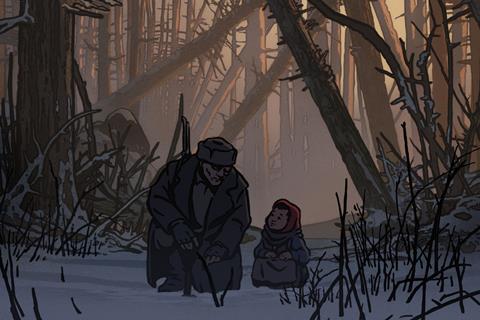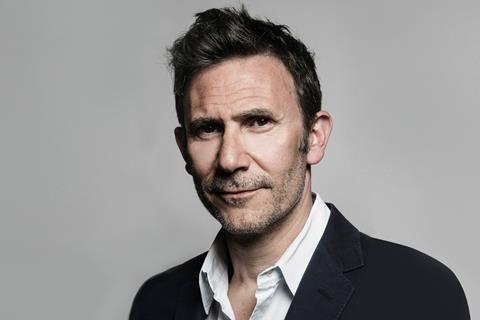
Michel Hazanavicius’ animated fairy tale The Most Precious Of Cargoes is the last film to screen in Cannes Competition this year, and will also open Annecy International Animation Film Festival in June.
The film marks Hazanavicius’s fourth appearance in Competition after The Artist (2011), The Search (2014) and Godard Mon Amour (2017). He also opened the festival in 2022 with Final Cut.
His latest is a 2D-animated feature based on a 2019 novel by Jean-Claude Grumberg, about a little girl taken in by a Polish woodcutter and his wife after her father throws her from a moving train en route to Auschwitz. The French-language film is narrated by the late Jean-Louis Trintignant with Grégory Gadebois, Denis Podalydès and Dominique Blanc also among the voice cast.
Hazanavicius co-wrote the script with Grumberg and is also a producer with Florence Gastaud for Les Compagnons de Cinéma alongside Ex Nihilo’s Patrick Sobelman. Co-producers include Jean-Pierre and Luc Dardenne’s Les Films du Fleuve, France 3 Cinema, RTBF, Voo and BeTv; 3.0 Studio handled the animation.
Studiocanal will release the film in all of the group’s direct distribution territories including France, UK and Ireland, Australia and New Zealand, Germany, Poland and Benelux.
The film is a fable and the words ‘Jew’, ‘Jewish’ and ‘Auschwitz’ are never mentioned in the script. Would you describe this as a Holocaust movie?

It’s not a movie about the Holocaust, but the Holocaust is part of the context of the film. It is a subject of the film, not the subject. The film wasn’t made to blame the executioners nor to glorify the victims. The subject is that even in such a horrible story, a man and a woman can show the beauty of humanity.
Yes, it’s also a film about war, it’s not innocent to represent the Holocaust, the deportation trains and the concentration camps, but the film is presented as a fairy tale starting with “Once upon a time…”. Little by little, through the eyes of the characters, reality starts to creep in.
When Patrick Sobelman, the producer at Agat Films - Ex Nihilo, first spoke to you about the project more than five years ago, what was your reaction?
I hesitated. I never wanted to make a film about the Holocaust. I didn’t feel it was my role to do that. It’s the story of my grandparents, my parents indirectly, but not really my story to tell. But the book written by Jean-Claude removed all of my doubt. As a director, when someone gives you such a beautiful story, it’s a privilege.
Jean-Claude has also been my parents’ best friend since they were 15 years old. My own family connection to the Holocaust also played a role – my grandparents escaped from being deported to Auschwitz.
Would you say it’s a children’s movie?
If parents want to show it to children who are younger [than 10 or 11], then I didn’t want to make a film to traumatise them. In fairy tales – at least in France – the characters never have first names or last names – they are called ogre or monster, they are just archetypes. The fairy-tale format and animation allowed me to tell this story with a certain distance.
What did the writing process entail, both in the collaboration with Jean-Claude Grumberg and in terms of research involved?
He told me, “I’ve already written the story” so gave me the responsibility to turn it into the film I imagined. He was more of a mentor. When I was too didactic in my descriptions of the camps, he said, “You don’t need to go into such detail, you’re not a professor.”
As far as research, I re-read Primo Levi, I re-read accounts from Holocaust survivors, I’d never been to Auschwitz so I went there. Such research allowed me to make choices in how I told the story.
How was the filmmaking process different from your live-action work?
When you want to redo things in animation, it can get expensive and I had the financing to make a film to fit into one hour, 15 minutes. I made a storyboard for the first shoot, then went back with other illustrators and made a more complete storyboard for the animation process. I drew all of the human characters and worked with other illustrators who drew the scenery before the animators came in to take over the animation.
Was the film a tough sell, even with your track record?
Studiocanal became a partner on the film right away. France Televisions also came on board. So, no, the financing wasn’t complicated. France is a very welcoming place to fund projects like this. But the financing was blocked because of Covid; suddenly we had no more international financing because distributors simply couldn’t work. So in the meantime, I made Final Cut. I made a comedy that really did me good, then I came back to work on this film.
The film is being released in a complex time on the geo-political landscape, particularly with anti-semitism on the rise. Did you change anything based on current events and how do you feel about premiering it right now?
I’m not scared at all. The film was not made as a reaction to anti-semitism. The film has a humanist, peaceful message. It is a message of pure love. It was out of the question to change anything. The context changed of course – there has been a rise in anti-semitism – but I am convinced this is the best response to it.
All forms of racism and exclusion are based on ignorance and lack of knowledge about the other. The film tells the story of a piece of the history of the Jewish people, so I invite anti-semites to come and see the film. Also, the response to hate is not hate. What opposes hate is love and that is the position of this film.
Despite your success on the international stage, not least a best director Oscar for The Artist, you’ve yet to work in Hollywood or direct an English-language film. Aren’t you tempted?
I’d accepted two projects for big American studios, but their way of operating isn’t for me. I love American actors, I love the legend of American cinema. I’d love to make an American film, but I could only do it in the way that I make movies, which is not very American unfortunately.
In France, the director is the decider, the boss. Unless you’re David Fincher or Steven Spielberg, it’s much harder for someone like me in the United States. Maybe an independent film one day – who knows?















![[L-R]: Amanda Villavieja, Laia Casanovas, Yasmina Praderas](https://d1nslcd7m2225b.cloudfront.net/Pictures/274x183/6/4/1/1471641_pxl_20251224_103354743_618426_crop.jpg)









No comments yet